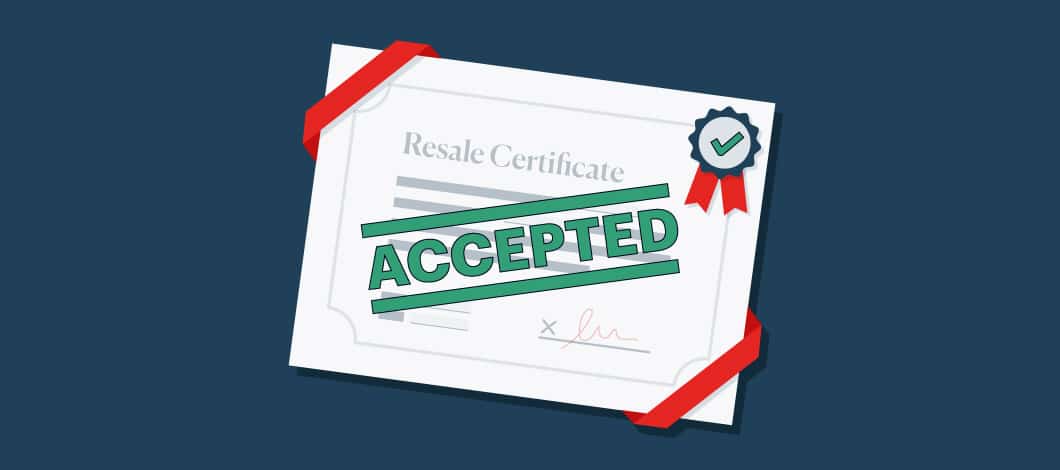According to Internet Retailer, Americans spent $517.36 billion online in 2018, a 15 percent increase from 2017. Clearly, the impact of ecommerce is expanding—and there is plenty of room for your business to be a part of this growth. Many of the retail shops that operate online sell products that they don’t manufacture themselves. Doing business this way might eliminate the trial and error that goes into manufacturing, but entrepreneurs pursuing these opportunities still face new hurdles and requirements, including an essential credential known as a resale certificate.
In this guide, we’ll introduce you to resale certificates and how they relate to tax-exempt certifications, sales and use tax requirements for each state and how you can get a resale certification for your business.
What Is a Resale Certificate?
A resale certificate is a document that allows a business to make purchases with the intention of reselling the product without paying local sales taxes. Examples of products often resold include wholesale items and raw materials used in manufacturing. To avoid paying local sales taxes, present a copy of your resale certificate, also known as a tax-exemption certificate, to the wholesaler. It’s then your responsibility to collect the tax from your customer when you sell the item.
Usually, a resale certificate has the buyer’s name and address, the reseller’s permit number, a description of the goods involved in the transactions and a statement that the property being purchased will be resold. In addition to allowing your business to buy goods without local taxes, a resale certificate extends your purchasing power. Since resale certificates eliminate state taxes on goods intended to be resold, your wholesale dollar stretches further, broadening your capacity to take on more merchandise. By buying in bulk, the likelihood of purchasing at a discount increases, allowing you to offer more competitive pricing to your customers.
The Differences Between Resale Certificates and Sales Tax Permits
While they have different names, sales tax permits and resale certificates are part of the same family. Technically, a resale certificate is a specific type of sales tax permit. Depending on your circumstances and location, a sales tax permit may take the place of a resale certificate, while other scenarios require you to have both documents. Owners conducting business in states with no sales tax (Alaska, Delaware, Montana, New Hampshire and Oregon) for example, need to have a sales tax permit to use a reseller certificate.
One of the biggest differences between these two documents is that while sales tax permits are universally applicable and displayed when needed, you will need a resale certificate for each unique seller you work with.

How to Get a Resale Certificate
Getting a reseller certificate begins by applying through the state’s tax department where you have a physical address, not where the business was incorporated or organized. If your business is operating in a state outside of the state in which your ecommerce business was organized, you’ll need to complete a Foreign Qualification process to conduct business in a different state.
After receiving your tax exemption certificate, the state will begin providing statements on a quarterly or monthly basis. If you operate or plan to operate in other states, you’ll need to repeat this process for each corresponding Commonwealth. You will need a copy of your resale certificate for every instance in which you use one, in addition to securing one for each applicable state. Practically, this means if you have relationships with multiple wholesalers, you’ll need a resale certificate for each.
Given every state has unique requirements, it’s recommended that you get in touch with your local tax office, CPA or lawyer. It should also be noted that eight states (CA, FL, HI, IL, LA, MD, MA, WA) and the District of Columbia do not accept out of state resale certificates. For example, if you’re a Missouri reseller looking to purchase goods in Illinois, your vendor will not be able to accept your tax-exempt status.
To get an idea of what the process may be like for your business, here are links for the sales and use tax forms and applications pages for each state, aside from Alaska, Delaware, Montana, New Hampshire, Oregon and the District of Columbia:
Arizona
Arkansas
California
Colorado
Connecticut
District of Columbia
Florida
Georgia
Hawaii
Idaho
Illinois
Indiana
Iowa
Kansas
Certain states will require certificate renewal at a given time, while others last forever. Taxjar has put together a tremendous resource on this very subject that is populated with new information as it is available. Beyond the state links above, this can be quite helpful to address any questions you have about your specific circumstance.
Working With Resale-Certified Customers
Wholesale businesses are not the only entities who can accept valid resale certifications. While it’s more common for retailers to work with wholesalers for these types of transactions, retailers can work directly with resellers. However, it’s important to note that even if the reseller’s certificate is valid, you are under no obligation to accept it. If you operate a retail business, you can choose whether or not you would like to work with customers who present resale certificates.
For the majority of businesses, failing to collect sales tax properly will leave your business open to, and responsible for, paying any sales tax attached to your goods. To learn the right way to accept a resale certificate and protect your business, here are four tips for working with a reseller:
1. Authenticate the Certificate
Considering not every resale certificate is presented in the form of a physical document, business owners can check the validity of a certificate online. Verifying online allows you to check the certificate number and the certificate’s expiration date.
2. Verify the Certificate Is Filled Out Completely
In this step, you’re certifying that the names, address, business purpose and signatures are accurate. These checks are done to prevent yourself in the event of an audit.
3. Establish the Intent of the Reseller’s Purchase
States aren’t asking businesses to review each detail of a business they transact with. However, much like document verification, this step is designed to demonstrate once again that your business did everything within appropriate means to explore the intentions of the reseller.
For example, if a fitness equipment reseller presents you with a resale certificate claiming to own an exercise equipment store, but is instead purchasing dumbbells for their home gym, it’s likely that this purchase is invalid. Your business can refuse the resale certificate and not worry about paying uncollected sales tax.
4. Keep the Resale Certificate on File
Much like other tax documents you have on file, it’s recommended that you keep resale certificates on hand for at least five years after your first transaction. In the event that your business is audited, having copies of these certificates (or record of their document number) will be crucial to keeping you safe.
If you have additional questions about how working with resale-certified customers can affect your business, ask your local tax office, CPA or lawyer.
The Final Word on Resale Certificates for Ecommerce
Whether you’re a brick and mortar business or an online shop, the application process for getting a resale certificate is the same for everyone and, ultimately, isn’t a difficult process. For online businesses and ecommerce entrepreneurs, there is plenty of room on the Internet for your resale shop or idea.
While there are many steps you need to take to expand your digital business, securing a resale certification is a building block that will set you up for future success. Understanding the ins and outs of the tax code gives your business the chance to grow and bypass specific state taxes. Beyond resale certificates, ask your CPA about other tax-exemptions and sales and use tax that could benefit your business.











